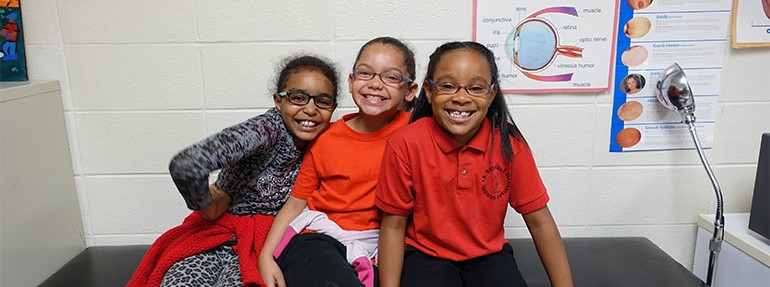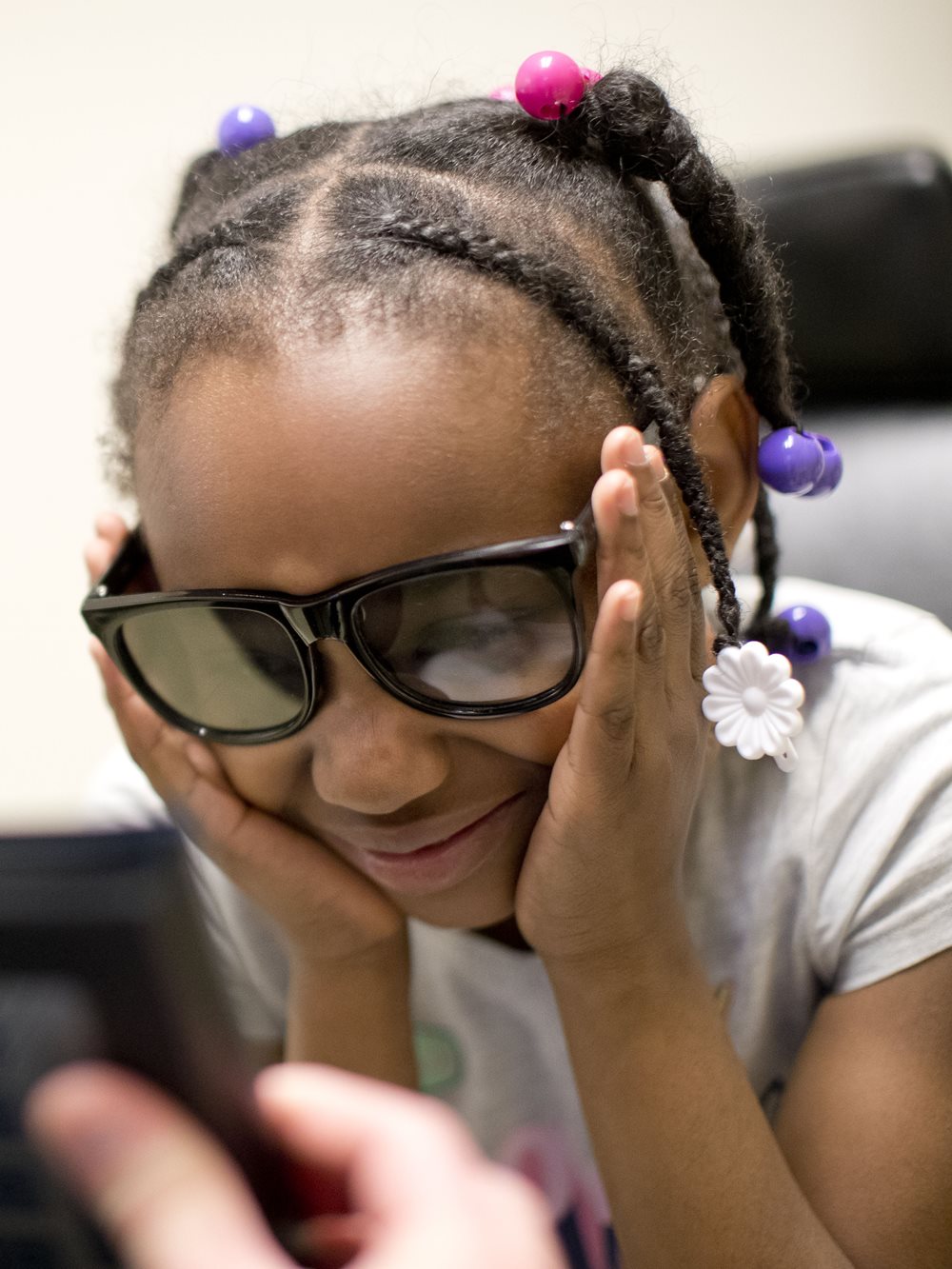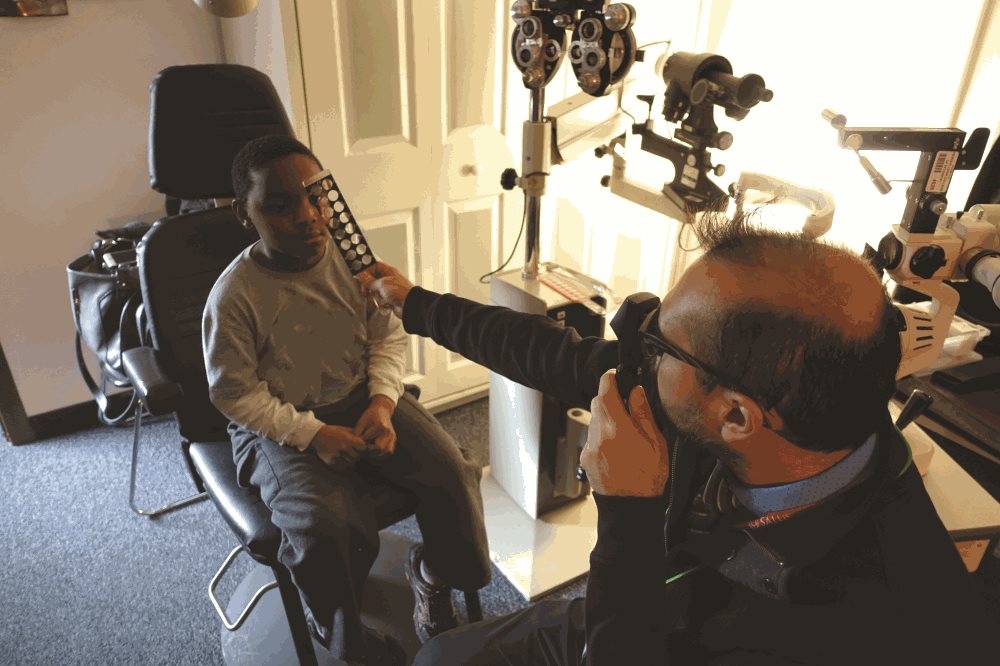
Third-grader, Yerani Diaz-Hernandez, once sat quietly in the back of her classroom at Whitehall Elementary School in Norristown, Pa. A good student, she often hesitated to participate in class because she was unable to see what her teacher was writing on the board. But once she received proper eye care and prescription eyeglasses, both her vision and confidence improved.
“Before, when I didn’t have the glasses [my teacher] would ask me questions, and I couldn’t see the board that well,” she said. “I would just feel kind of bad for myself, but when the glasses came, I could see better, and I felt proud of myself.”
Eighty-six percent of children begin each school year without having had an eye exam. A large part of a child’s success in the classroom depends on their ability to see clearly. Early detection of vision problems in children and treatment with eyeglasses and other management strategies could eliminate one of the barriers to learning and academic success that economically disadvantaged children encounter.
Children who have vision issues may also have difficulty reading, remembering numbers and letters, completing math equations, and writing. Comprehensive vision care can help resolve many of these issues. Unfortunately, in Philadelphia and the surrounding area, access to comprehensive eye care services is not always available. This is particularly true for children living in poverty whose families don’t have the means to access quality eye care services.
 In the ‘90s, The Eye Institute (TEI), the clinical facility of the University’s Pennsylvania College of Optometry (PCO), collaborated with the School District of Philadelphia (SDP) to address the vision care needs of socio-economically disadvantaged children.
In the ‘90s, The Eye Institute (TEI), the clinical facility of the University’s Pennsylvania College of Optometry (PCO), collaborated with the School District of Philadelphia (SDP) to address the vision care needs of socio-economically disadvantaged children.
According to Susan Oleszewski, OD ‘76, MA, PCO associate professor, Paul Vallas, who served as the superintendent of the SDP from 2002 through 2007, had a particular interest in children receiving vision care services as early as possible. What originally started as a project that provided vision care to children enrolled in summer school soon expanded. The partnership not only benefitted Philadelphia’s children, but it also helped the University’s optometry interns get pediatric clinical experiences. “It is a symbiotic relationship that has worked well for both organizations,” Dr. Oleszewski said.
Since the collaboration began, each academic year, a vision care team from TEI travels to local schools to provide vision screenings. The team screens between 30 to as many as 90 children. Any child who fails the state-mandated screening is then referred to TEI for a comprehensive exam. TEI uses its charity fund to transport children for care. If a child requires prescription eyeglasses to remediate their vision problem, they receive two pairs — one for home and one for school. Since 2010, more than 13,000 children have been helped through the program.
According to Franklin S. Edmonds Elementary School nurse, Margo Owen, many students who fail the vision screenings do not have adequate follow-up care. “This program enables students who would otherwise not be further evaluated the opportunity to have their evaluations, receive prescriptions for corrective eye wear and/or therapy for various eye defects,” she said. “Many of these students have improved in the areas of their academics, reading and testing due to better vision with corrected deficits/challenges.”
The program has expanded in the last five years and now provides vision care services to underprivileged children in Montgomery and Delaware county school districts.
In 2013, a vision care team from TEI started providing vision care services for children in the Norristown Area School District (NASD). A rotating school-based vision clinic was established that moves from school to school. Last year, 180 children enrolled in the NASD received comprehensive eye care.
Luis Trujillo, OD ’09, one of the vision care providers in the NASD initiative has been involved in every aspect of both initiatives in Philadelphia and Norristown. As a PCO student, he participated in vision screenings in Philadelphia’s schools; during his pediatric residency at TEI, he supervised school vision screenings and provided follow up exams for children who failed the screening. Five years ago, he was the provider involved in the pilot project in Norristown’s Gotwals Elementary School.
 Dr. Trujillo has continued to be a vision care provider in the school-based clinic in Norristown. The totality of his experiences has increased his passion for providing care to those who have difficulty accessing quality healthcare services. “We need to take responsibility for the care of those that need it,” he said.
Dr. Trujillo has continued to be a vision care provider in the school-based clinic in Norristown. The totality of his experiences has increased his passion for providing care to those who have difficulty accessing quality healthcare services. “We need to take responsibility for the care of those that need it,” he said.
A highlight of his time in the NASD has been seeing first-hand the dedication of the school nurses. “We were there [at Musselman Learning Center] distributing glasses and a nurse gave money out of her own pocket to help clothe a homeless student,” he said. “This is the level and the caliber of people we are dealing with when it comes to caring for the community. Just being able to be part of that is pretty rewarding.”
According to Kerry Gidley, Whitehall’s school nurse, the convenience of the program and the care the Salus team has provided this year alone has made a significant difference. And, the look on each child’s face when they receive their glasses is “the best part of her job.”
“It’s made an unbelievable difference; some families in the community rely on it and it’s the first time they received glasses,” she said.
Ultimately, the goal is to correct a child’s vision problem and in the process, help improve classroom performance and self-esteem — like Yerani. “I have students who struggle academically and we tend to find the vision problem plays a huge role in that,” Marshall Street Elementary School nurse, Kim Falco, said. “Once they get glasses it helps so much with their individual education plan to customize it to say okay, it’s not a vision issue.”
Using data from the Pennsylvania Department of Education, the University targets school districts who have a large percentage of economically disadvantaged children. Over the last two years, the vision care initiative has also expanded to Chester Upland, Abington, Cheltenham, and Jenkintown School Districts to name a few.
The programs are funded through local foundations and the University’s annual “Looking Out for Kids” (LOFK) charity fundraiser, originally spearheaded through the efforts of Dr. Oleszewski. With corporate and community support, the fundraiser is crucial for maintaining and expanding the programs.
Twelfth Annual "Looking Out for Kids" Charity Fundraiser
Saturday, November 3, 2018 | 6:30 p.m.
Hilton Philadelphia
4200 City Avenue | Philadelphia, PA
Cocktail Chic